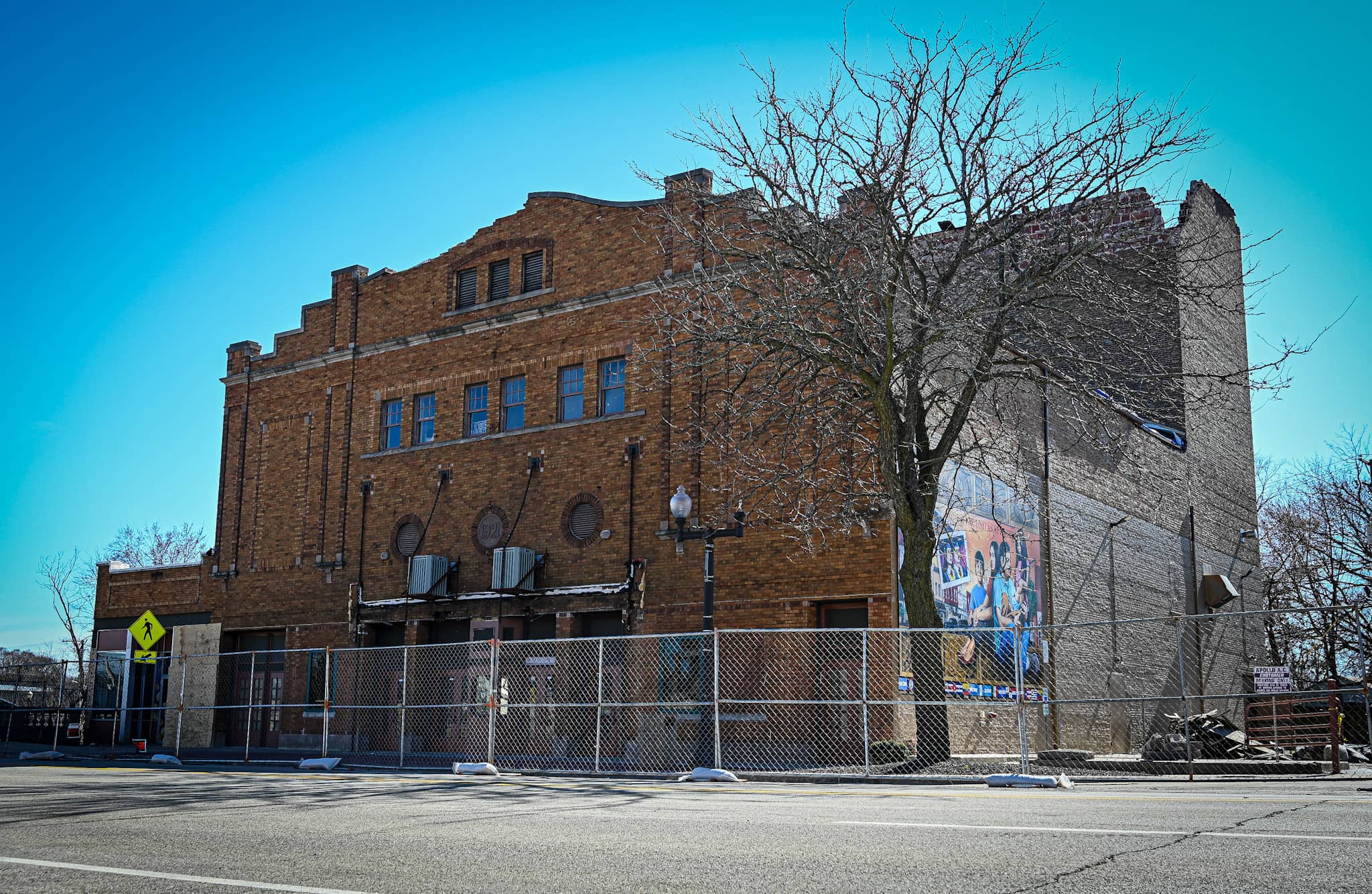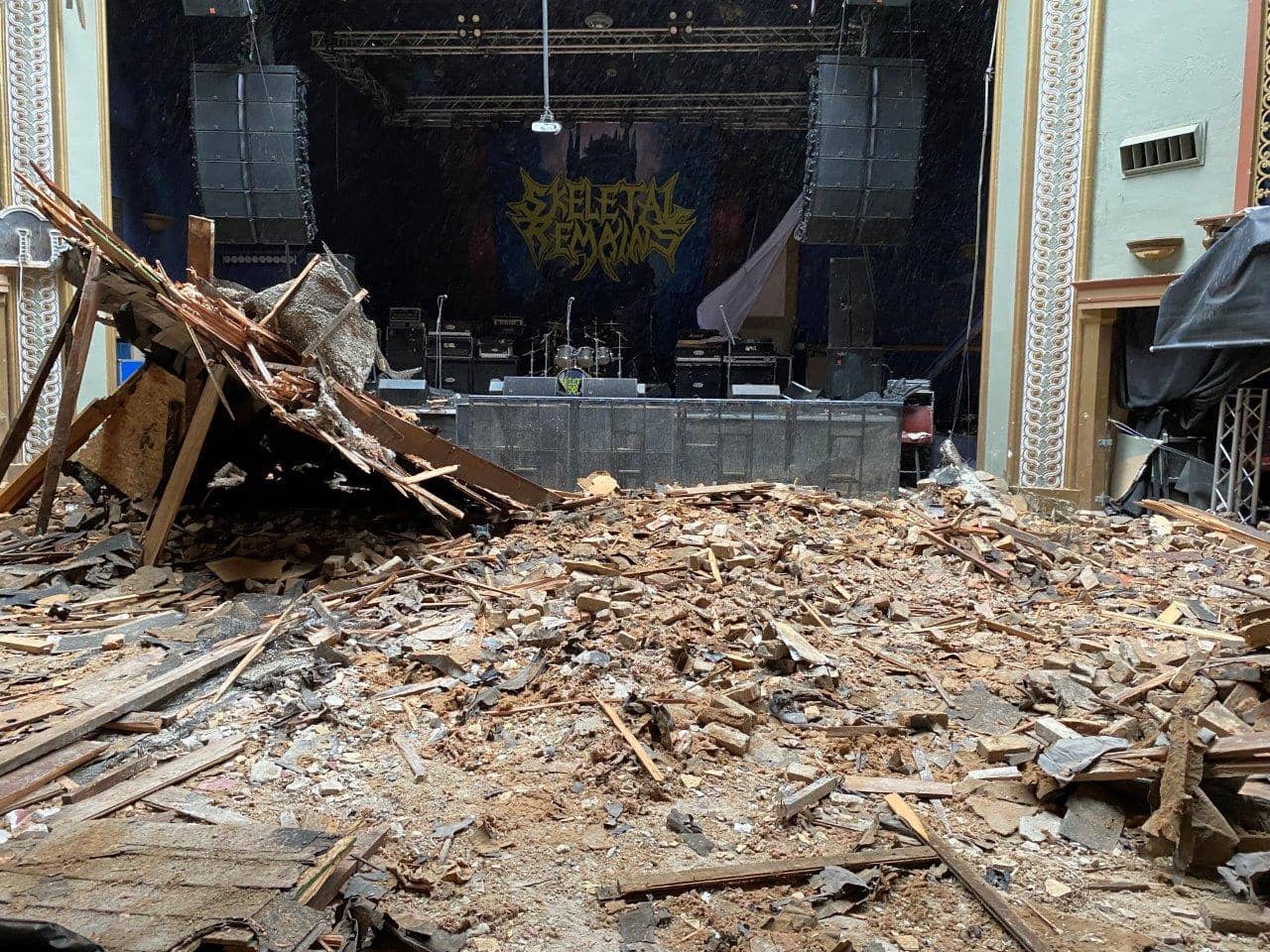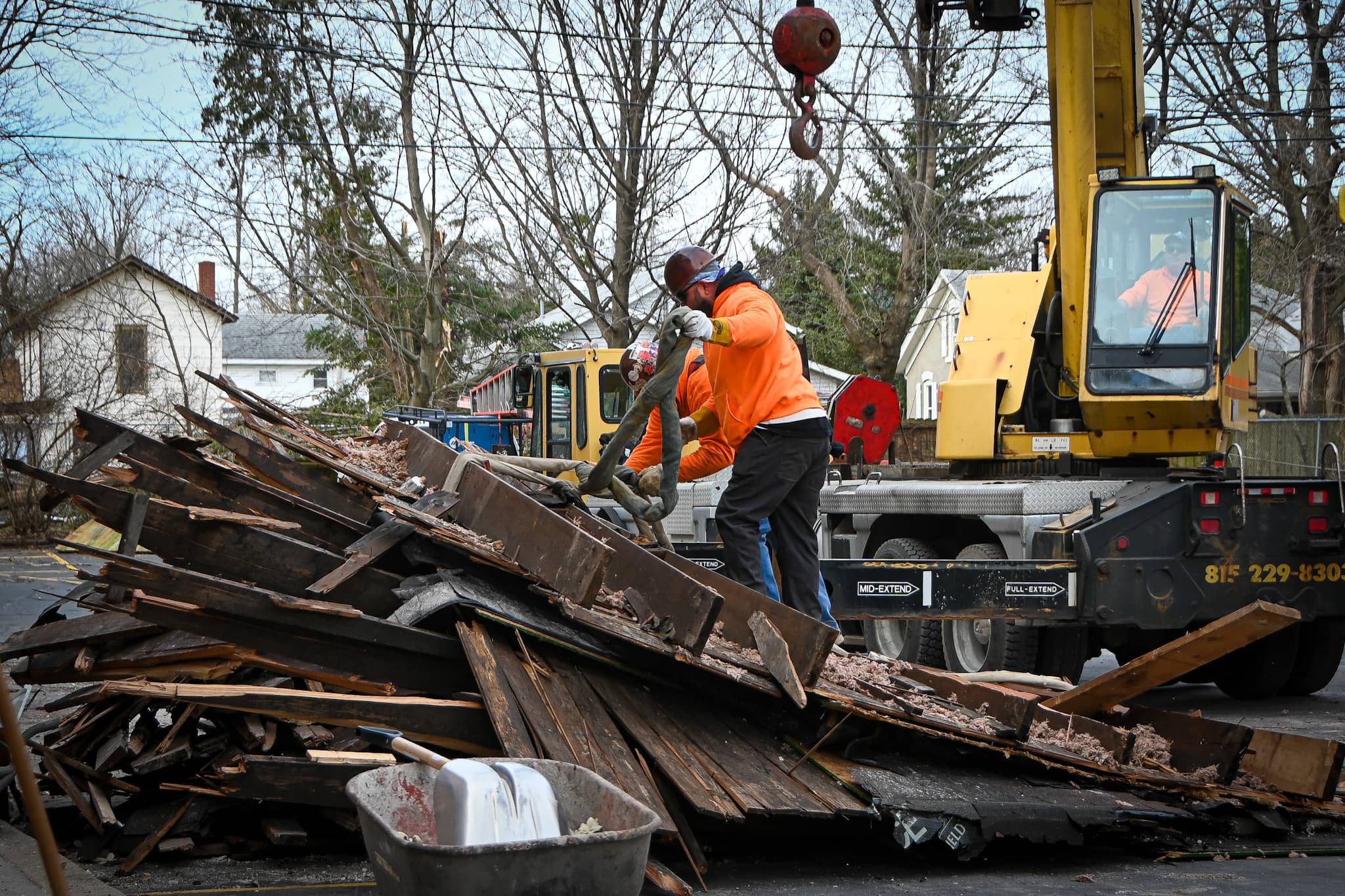 The Apollo Theatre AC, 104 N. State St., is fenced off on Wednesday, April 5, 2023, in downtown Belvidere. The theater was damaged in a tornado on March 31 during a concert. There were 48 people injured and one person was killed. (Photo by Kevin Haas/Rock River Current)
The Apollo Theatre AC, 104 N. State St., is fenced off on Wednesday, April 5, 2023, in downtown Belvidere. The theater was damaged in a tornado on March 31 during a concert. There were 48 people injured and one person was killed. (Photo by Kevin Haas/Rock River Current)By Kevin Haas
Rock River Current
Get our mobile app
BELVIDERE — For Violet Munoz, the physical wounds from surviving a tornado that ripped open the Apollo Theatre have started to heal.
The psychological pain may last much longer.
The 25-year-old artist from Belvidere had five staples fastened to her scalp to close a laceration caused by debris that fell from the roof of the theater more than a week ago. She had bruises and scrapes across her body and splinters lodged into her hands from trying to claw herself out from beneath the rubble before her boyfriend, Erik Beal, and a host of others pulled her free.
“I want people to know just how fortunate we are that there were strong men willing to do heroic things in order to make sure people didn’t suffocate to death,” said Munoz, who said she suffered a severe concussion. “I feel like it’s literally a miracle they were able to get me out when they did.”
Related: Boone County firefighter responded to the tornado at The Apollo, then he returned to devastation at the family farm
Munoz was among dozens who were injured, including one man who died, when an EF-1 tornado ripped a path from Davis Junction to downtown Belvidere on March 31 and struck the 101-year-old theater as roughly 260 people were inside for a concert.
The staples have been removed from her head, and Munoz is steadily recovering from the injuries she sustained. When she spoke to the Rock River Current last week, she was still piecing together memories from that night as she recovered from the head wound. She’s also processing the trauma of surviving the chaotic and catastrophic event.
“I’m hearing it from other people’s perspectives and then I’m also slowly regaining the reality of it myself because I’m healing,” Munoz said. “One hundred percent I think the mental aspect of this is going to be the main thing that’s hard to get over.”
Mental health experts in the region say the lasting psychological effects of surviving a traumatic event are often overlooked by the general public. But as the visible and physical scars heal, there’s a hidden healing that needs to take place, too.
“Trauma as a definition is different for everybody,” said Xavier Whitford, a mental health first aid instructor who teaches the public ways to respond to a mental health crisis. “What’s traumatic for one person might not be traumatic for someone else, but the reality is there’s going to be many people who were part of that night who are going to be affected from that trauma.”
Related: ‘We’re all rooting for The Apollo’: Officials optimistic the historic Belvidere structure can be saved
Whitford, who has spoken with Munoz on several occasions since the tornado, said some survivors may not realize the psychological effects of what happened until much later.
“PTSD and trauma effects can happen at the weirdest times. There’s no predicting it,” Whitford said. “You just don’t know how it’s going to effect each individual, but the reality is there’s going to be many people whose mental health is affected long term because of that.”
‘Be kind and gentle with yourself’
Aaron Dennin, another one of the men who Munoz credits with saving her life, said he’s been talking with other survivors of the tornado as they process what happened. Mental health experts say support networks like that are an important part of the healing process.
“It’s been a very numb experience,” Dennin said. “After the initial shock and the wave of emotions its been very hard to process.”
The 26-year-old from Poplar Grove remembers hearing a loud bang before the power went out. Then there was a rumbling from above.
“Fortunately, I was able to dodge most of it,” he said. “It only got my legs. It was only just a few bruises.”
 This image from the Illinois Emergency Management Agency shows the interior of The Apollo Theatre on Saturday, April 1, 2023, in downtown Belvidere. (Photo provided by Illinois Emergency Management Agency)
This image from the Illinois Emergency Management Agency shows the interior of The Apollo Theatre on Saturday, April 1, 2023, in downtown Belvidere. (Photo provided by Illinois Emergency Management Agency)Dennin said he and many others inside The Apollo started immediately helping dig people out from under the rubble.
“Once I realized after the shell shock that I was OK, I realized that there were people still under there and I didn’t hesitate after that,” he said. “I just went in and helped until the fire marshal said everyone was out.”
More news: Hard Rock Casino Rockford construction goes vertical with first steel columns
Munoz was buried beneath debris until her boyfriend, Beal, grabbed her hand and started digging her head out so she could breathe. Dennin, who is friends with Munoz and Beal, recalls seeing her head emerge from the debris.
“The dust was so bad that at first we couldn’t tell who was who,” he said. “There were a lot of people, once they realized they were OK, who just came in and really, really helped get people out alive.”
Carol McNeal, a licensed clinical social worker and behavioral health provider at Crusader Community Health, said traumatic incidents like the one at Apollo have the potential for residual effects such as nightmares, depression, feelings of isolation and fatigue. Bad weather can increase anxiety or trigger the return of those emotions. Physical wounds can also serve as a difficult reminder.
“Any time you look in the mirror that’s a reminder that you went through something traumatic,” said McNeal, who grew up in Belvidere and fondly recalls watching $1 movies at The Apollo.
She said people processing the trauma should lean on a support network and try to stick to their normal daily routine. They also should be patient and give themselves time to heal.
“Nobody is taught how to manage their anxiety day to day. We don’t get that class in school,” she said. “Be kind and gentle with yourself. Sometimes we like to push ourselves, like ‘I’m fine. I’m fine. I’m fine.’ Until your body tells you you’re not fine.”
More news: From Davis Park to Times Theater: $1.4M in state funds supports Rockford tourism and attractions
McNeal said friends and others in a survivor’s support system often don’t know what to say, but they should avoid trying to compare their loved one to someone who “had it worse.” They also should avoid suggesting when someone should get over the trauma.
“Sometimes it’s just being there and listening, you don’t have to fix it,” McNeal said.
‘I can’t even listen to thunder’
Beal, who came to his girlfriend’s rescue, said he scrambled to find Munoz after another concert attendee helped him free his leg from beneath a portion of the roof.
“I just started calling her name, even when I was still pinned to the floor,” Beal said. “I eventually started hearing muffled screaming, and she had freed her arm from part of the debris.”
Once he found her, the 26-year-old Belvidere man started pulling wood off a pile as quickly as he could and handing it to others who were helping. Eventually, the pile was lightened enough to free her.
“She slid out of her boots to get out from under the rubble,” Beal said.
She was taken to the UW Health hospital in Belvidere, where she was kept overnight.
“I had a head wound that was dripping blood onto my T-shirt,” Munoz said. “I couldn’t even feel my body yet, but I was moving and that’s all I could process.”
Beal said two other friends of his were taken to the hospital with serious injuries.
 Cleanup crews work to remove portions of the roof of The Apollo Theatre on Sunday, April 2, 2023. The debris was hoisted over the brick walls of the theater by a crane. (Photo by Kevin Haas/Rock River Current)
Cleanup crews work to remove portions of the roof of The Apollo Theatre on Sunday, April 2, 2023. The debris was hoisted over the brick walls of the theater by a crane. (Photo by Kevin Haas/Rock River Current)When potentially severe storms rolled through the region again four days later, Beal said he felt anxiety he had never experienced from a storm before.
“Lately, I can’t even listen to thunder without losing it a little bit,” he said. “I’m just glad that my friends made it out, mostly.”
‘Lasting effect on our community’
Munoz said she initially avoided watching videos of the rescue efforts online because she knew it would be difficult to process. She returned to The Apollo a few days after the tornado to collect her jacket and her thoughts.
“It’s coming through, processing more as time goes on and it’s becoming a little overwhelming,” Munoz said. “It’s so traumatic right now even trying to process it.”
Related: Close-knit farming community rallies to help Rockford-area family after tornado
The tornado struck while the concert had gone into an intermission because of the severe weather. Munoz said she checked her phone after the intermission was called and noticed the tornado warning.
“Then, all of a sudden, I was just underneath the rubble,” she said.
She said Whitford reached out to her as she was recovering to stress the importance of taking care of her mental health, too.
Whitford is the executive director of the Tommy Corral Foundation, a nonprofit dedicated to helping people affected by a mental health crisis or suicide. The foundation is named for her son, who died by suicide in 2014. Corral and Munoz were friends.
“It’s important that she brought light to that mental health is going to be affected by this,” Whitford said. “I think that’s something that’s often overlooked, and it can have a lasting effect on our community and the people in it.”
This article is by Kevin Haas. Email him at khaas@rockrivercurrent.com or follow him on Twitter at @KevinMHaas or Instagram @thekevinhaas